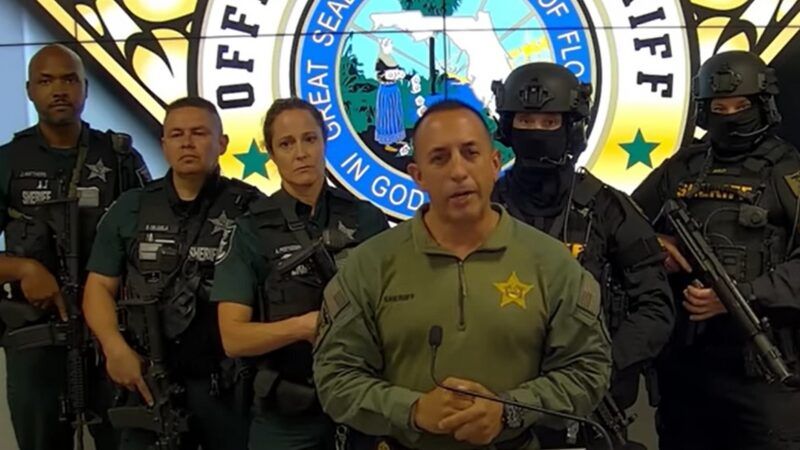Florida Sheriff Arrests 10-Year-Old, Releases Mug Shot and Perp Walk, Then Uses Media Tour To Brag About It
“Scared straight” juvenile policing programs have a history of not working. They’re not the solution to school shootings.

"Present deadly physical force at one of our schools, we're not waiting one second. We are going to kill you, 'cause you can't kill evil enough," declares Lee County, Florida, Sheriff Carmine Marceno, in a TikTok video, in front of a pack of gun-wielding deputies, while Journey's "Separate Ways (Worlds Apart)" inexplicably serves as background music.
It sounds almost like a joke, something from a television show like Reno 911! that finds humor in some of the most awkward behaviors of law enforcement. It's not. Marceno posted it on his YouTube channel Friday, part of his response to the Robb Elementary School shooting in Uvalde, Texas.
Much less amusing was his department's decision to respond to an alleged school violence threat by a 10-year-old by arresting him on Saturday, releasing the boy's full name and a mug shot, and even a perp walk. The boy is accused of texting a threat to commit a mass shooting using images of assault rifles, according to Marceno. The parents of the recipient of the text contacted the police.
It seems likely that the boy had no plan to commit violence at all, and Marceno fully acknowledges this. The Lee County Sheriff's Office obviously had to investigate the threat, even if it came from a child. That's not in dispute. But Marceno has also decided to launch a public campaign out of the incident, using this boy to draw attention to what he thinks is the right way to prevent school shootings by deliberately humiliating children who act out in ways that can cause real fear.
Marceno is on a full press tour following the boy's arrest, and he's retweeting the press coverage of the decision to treat the child as though he was arrested for knocking over a bank. He's telling parents that they need to sit their kids down and teach them that fake threats can have real consequences. In an appearance on Fox & Friends (which he has excerpted on his YouTube channel) he says, "We need to get back to the old school and hold people accountable."
Marceno calls himself the "law and order sheriff" on his own video titles and Twitter feed (he even uses a hashtag, #LawandOrderSheriff), and the whole press tour has a weird feel of a branding effort rather than an actual educational drive.
In the days since the shooting, we've learned more about the Uvalde shooter, his troubled background, and his regular threatening behavior toward others. We've also learned that the Uvalde Police officers on scene absolutely and horrifyingly failed to properly respond to the violence unfolding at the school. In that context, the performative nature of Marceno's behavior is certainly an attempt to try to reassure people that what happened in Uvalde won't happen under his watch.
But there's also a lesson here for those who think that more policing (and not effective policing) is the answer to school shootings. Policing schoolchildren doesn't necessarily lead to more safety—but it does lead to more arrests of kids. It's absurd now to look at the Uvalde shooter's background and conclude that the shooting happened because he wasn't shamed enough by police for his bad behavior. The Daily Mail notes that Marceno thinks his aggressive shaming response is part of a new "scared straight" effort that parents appreciate. And he no doubt has supporters who believe that this is the right approach: that if kids were punished more publicly for recklessly sending out threats, they'd stop doing it.
But research has shown that "scared straight" approaches—where police and courts expose troubled kids to the prisons and policing system in an attempt to get them to behave better—don't actually work, and in fact may make problems worse. An analysis of studies of "scared straight" intervention programs published in 2013 found that they actually have a harmful effect on juveniles and don't deter delinquency or crime in the long run. In fact, researchers found that crime increased among those who participated in such programs compared to those who did not.
Some people think it works, though, and Marceno certainly wants people to think it does rather than question the wisdom of making a media performance out of arresting a small child. He is making assumptions about what the child is going to learn from the experience, and what he thinks the kid will learn doesn't match what researchers have discovered.
But it sure looks like Marceno is doing something, right? There is something to be learned here: An elected official will happily and proudly make a public performance out of humiliating a small child in order to bolster his own reputation, score media hits, and reinforce tactics that make certain constituencies feel like something is being done even if those tactics don't actually work.


Show Comments (46)